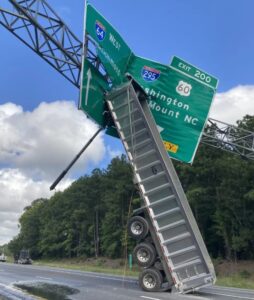Recently, the large bed of a tractor-trailer collided into an overhead road sign on Interstate 64 in Richmond. The bed then separated from the cab of the big rig and remained upright, smashed against the sign. The damage was so extensive, that the signs and structure had to be removed.

Photo credit: Virginia State Police
Does the trucking industry have regulations?
This is but one example of the dramatic trucking mishaps that take place on U.S. freeways every day. From trucks spilling timber onto highways to shocking research on truck drivers and illegal stimulants, it may seem that the trucking industry needs a regulatory overhaul. The opposite is true – trucking companies are bound by laws that adhere to a strict code of conduct. The problem is that not all trucking businesses play by the rules.
When trucking companies place profit over safety
Trucking companies are legally bound to hire and train safe, qualified drivers. However, according to the Federal Motor Carrier Safety Administration (FMCSA), “The tremendous demand for qualified truck drivers has placed a burden on companies’ recruiters. It has been reported that there is such a demand for truck drivers that some recruiters will hire unqualified drivers if the alternative is having trucks sit idle in their lots.” No company should place profit before safety; this negligence can produce disastrous effects.
Negligence within the trucking industry manifests in many ways, including:
- Hiring drivers without a valid commercial license (CDL)
- Failing to perform a background check on a driver’s safety record
- Not requiring drug and alcohol testing
- Failing to fire a driver when he/she fails a drug test
- Not providing proper training to drivers
- Forcing employees to drive more hours in a day than permitted by law
- Failing to enforce disciplinary action when truck drivers violate regulations

When an unqualified driver causes an accident, the trucking company is responsible. A loaded 18-wheeler can weigh up to 80,000 pounds. Anyone maneuvering these vehicles on public roads requires a comprehensive safety training program, with regular reviews and updates to accommodate rapidly evolving safety features. An unfortunate truth is that many trucking companies do not treat their drivers properly, give them the tools to operate safely, or recognize the tough job a trucker has.
Even billion-dollar companies have driver staffing issues
Tanner Lynn Horner was driving a FedEx van when he accidentally hit 7-year-old Athena Strand. Though she wasn’t seriously injured, Horner confessed to police that he didn’t want her to tell her father what happened, and killed her inside his van. Her body was found in a ditch 200 yards away from her family home. Athena Strand’s parents accuse Big Topspin (the contracting company) and FedEx of being negligent in hiring, training, and supervising the contractor, and accuse both companies of improperly investigating his criminal and work history.
Adrian Dumitrache operated an Amazon truck while under the influence of alcohol. He drove the wrong way up a highway exit, collided with multiple cars, and dragged a resident along the road. The resident was eventually able to stop the truck by pulling the keys out of the ignition, but not before sustaining a broken leg, among other injuries.
These are just two examples of how well-known trucking companies can hire, train, and supervise the wrong drivers to operate their vehicles.

Is the life of a long-haul trucker difficult?
Much ado has been made about the proper vetting and training of truckers, but this attention should be maintained throughout the life cycle of their careers. Beyond random drug testing and training, companies should ensure that their fleet of drivers are in good health and experiencing somewhat balanced lives. A healthy, well-rested, and alert driver is more likely to perform better behind the wheel. While companies understand this, the familiar drive for profit can seep into best practices, and corrode the guardrails that keep employees safe.
“Driving a truck, especially long-haul, is a difficult lifestyle. There are long and irregular hours, poor living conditions on the road, and large amounts of time away from home. Often these conditions are exacerbated by poor treatment from shippers, receivers, and even their own company personnel. There is strong evidence of a link between the economic and scheduling pressures on drivers and crashes and violations of hours-of-service regulations. Analyses of how working conditions affect safety revealed that truckers who drive in excess of hours-of-service regulations, young drivers, and interstate drivers are the most likely to have an increased relative risk of crash involvement. Addressing the poor working conditions that contribute to driver turnover and safety problems is an urgent need in the industry,” confirms the FMCSA.
Drugs and the long-haul trucker
Incentives for profit see many companies urging their fleet of drivers to go faster, farther, more often, and with increased cargo. To keep up with demand and obtain financial incentives, some truck drivers will go to great lengths to do more. According to the National Institute of Health’s (NIH) Library of Medicine:
- Overall drug consumption is particularly high, at 27.6%
- Amphetamines (“meth” and other CNS stimulants) are at 21.3%
- Cocaine consumption 2.2%
Per the NIH, “Chronic and high dose consumption has been shown to decrease driving skills, placing these professional drivers at risk for health and road safety.” This is supported by data. According to the FMCSA, around 6% of large truck drivers involved in fatal crashes tested positive for at least one drug in 2019. This indicates that a significant portion of fatal tractor-trailer crashes may be drug-related, though exact numbers aren’t available due to testing limitations and reporting variations.
I’ve been in an accident with a large truck. What do I do next?
When it comes to an accident with a tractor-trailer, there’s no such thing as a fender bender. The property damage is extensive, and far too often, there are human casualties. If you or a loved one have been injured in a truck accident due to the negligence of the truck driver or trucking company, you needn’t shoulder this burden alone. You may be able to obtain compensation for your injuries. It is important to contact an experienced trucking lawyer; one who understands how to acquire and analyze employee records, training records from trucking companies, hiring records, dates of employment, and other relevant evidence.
For a free and confidential case evaluation, call the experienced trucking lawyers at Allen & Allen today at 866-388-1307. We are here to help.



